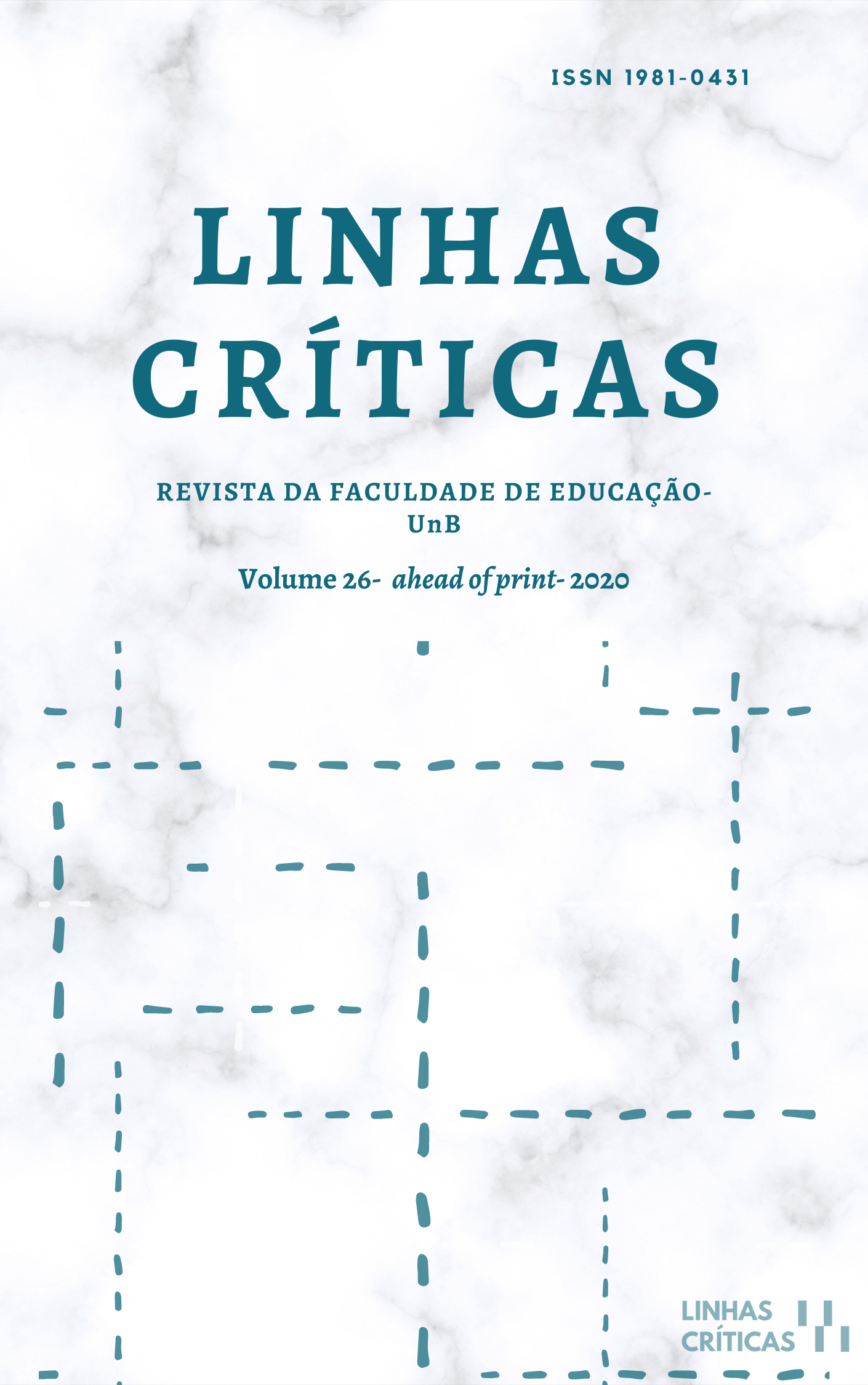“Being a student” in the university education
values aspects from the students’ perspective experience
DOI:
https://doi.org/10.26512/lc.v26.2020.32512Keywords:
University pedagogy, Students’ perception, University education Didactic, Academic engagementAbstract
The present study had as its objective to analyse the students’perceptions about positive and negative aspects of the academic experience in higher educaction. For that so, we applied an open virtual questionnaire and obtainned 305 answers from academicals students.The most relevant results indicated the satisfaction that the students feel when they realize their own development (31,5% of the participants) and the difficulties they face with the university teacher’s didactic perform (36,4%). These results reinforce the need of institutional policies and pedagogical practices that increases the curriculum of the courses to enable the obstacles to academic engagement of the studant.
Downloads
References
Almeida, M. I., & Pimenta, S. G. (2014). Pedagogia Universitária – valorizando o ensino e a docência na universidade. Revista Portuguesa de Educação, 27(2), 7-31. https://doi.org/10.21814/rpe.6243
Bogdan, R., & Biklen, S. (1994). Investigação qualitativa em Educação: uma introdução à teoria e aos métodos. Porto Editora.
Coulon, A. (2017). O ofício de estudante: a entrada na vida universitária. Educação e Pesquisa, 43(4), 1239-1250. http://doi.org/10.1590/s1517-9702201710167954
Cunha, M. I. da (2015). Quando forma é conteúdo: o campo da pedagogia universitária na formação de professores. In Cavalcante, M. M. D., Sales, J. A. M., Farias, I. M. S., & Lima, M. S. L. (Orgs.): Didática e a prática de ensino: diálogos sobre a escola, a formação de professores e a sociedade (pp. 1-16). EdUECE.
Dias-Sobrinho, J. (2015). Universidade fraturada: reflexões sobre conhecimento e responsabilidade social. Avaliação, 20(3), 581-601. http://periodicos.uniso.br/ojs/index.php/avaliacao/article/view/2322/pdf
Díaz, E. S. M., & Gómez, D. A. D. (2007). Una aproximación psicosocial al estrés escolar. Educación y Educadores, 10(2), 11-22. https://www.redalyc.org/pdf/834/83410203.pdf
Ferreira, A. L. (2014). Socialização na universidade: quando apenas estudar não é o suficiente. Educação em Questão, 48(34), 116-140. https://doi.org/10.21680/1981-1802.2014v48n34ID5732
Fórum Nacional dos Pró-Reitores de Assuntos Estudantis [Fonaprace]. (2018). V Perfil Socioeconômico e Cultural dos Estudantes de Graduação das Universidades Federais Brasileiras. Associação Nacional dos Dirigentes das Instituições de Ensino Superior. http://www.andifes.org.br/wp-content/uploads/2019/05/V-Pesquisa-do-Perfil-Socioecon%C3%B4mico-dos-Estudantes-de-Gradua%C3%A7%C3%A3o-das-Universidades-Federais-1.pdf
Franco, M. A. S. (2009). Prática docente universitária e a construção coletiva de conhecimentos: possibilidades de transformações no processo ensino-aprendizagem. Universidade de São Paulo. http://www.prpg.usp.br/pt-br/pae/etapa-de-preparacao-pedagogica/cadernos-de-pedagogia
Jardim, F. A. A., & Almeida, W. M. (2016). Expansão recente no Ensino Superior brasileiro: (novos) elos entre educação, juventudes, trabalho? Linhas Críticas, 22(47), 63-85. https://doi.org/10.26512/lc.v22i47.4776
Mancebo, D., Silva Júnior, J. dos R., & Oliveira, J. F. de (2018). Políticas, Gestão e Direito a Educação Superior: Novos Modos de Regulação e Tendências em Construção. Acta Scientiarum Education, 40(1). https://doi.org/10.4025/actascieduc.v40i1.37669
Oliveira, D. C. (2008). Análise de Conteúdo Temático-Categorial: uma proposta de sistematização. Revista de Enfermagem da UERJ, 16(4), 569-576. http://files.bvs.br/upload/S/0104-3552/2008/v16n4/a569-576.pdf
Pineda-Báez, C., Bermúdez-Aponte, J., Rubiano-Bello, A., Pava-García, N., Suárez-García, R., & Cruz-Becerra, F. (2014). Compromiso estudiantil en el contexto universitario colombiano y desempeño académico. Revista Electrónica de Investigación y Evaluación Educativa, 20(2). https://doi.org/10.7203/relieve.20.2.4238
Salles, L., & Silva, J. (2012). Diferenças, preconceitos e violência no âmbito escolar: algumas reflexões. Cadernos de Educação, 30(1), 149-166. https://www.periodicos.ufpel.edu.br/ojs2/index.php/caduc/article/view/1768%20/1643
Santos, B. S. (2010). A universidade no século XXI: para uma reforma democrática e emancipatória da universidade (3ª ed.). Cortez.
Silva, A. S. S., & Ribeiro, M. L. (2020). Engajamento estudantil na educação superior. Revista Eletrônica Pesquiseduca. 12(26), 50-63. http://periodicos.unisantos.br/index.php/pesquiseduca/article/view/904
Soares, A. B., Gomes, G., Maia, F. A. de, & Monteiro, M. C. (2016). Relações interpessoais na universidade: o que pensam os estudantes da graduação em psicologia? Estudos Interdisciplinares em Psicologia, 7(1). https://www.uel.br/revistas/uel/index.php/eip/article/view/23794/18379
Vitória, M. I. C., Casartelli, A., Rigo, R. M., & Costa, P. T. (2018). Engajamento acadêmico: desafios para a permanência do estudante na Educação Superior. Revista Educação, 41(2), 262-269. https://doi.org/10.15448/1981-2582.2018.2.27960
Published
How to Cite
Issue
Section
License
Copyright (c) 2020 José Leonardo Rolim de Lima Severo, Gabriela da Nóbrega Carreiro, Maristela Silva de Morais, Camila de Lourdes Cavalcanti Paiva, Ravi Cajú Duré

This work is licensed under a Creative Commons Attribution 4.0 International License.
Authors who publish in this journal agree to the following terms:
-Authors maintains the copyright and grants the journal the right of first publication, the work being simultaneously licensed under the Creative Commons Attribution License which allows the sharing of the work with recognition of the authorship of the work and initial publication in this journal.
- Authors are authorized to enter into additional contracts separately, for non-exclusive distribution of the version of the work published in this journal (eg publish in institutional repository or as a book chapter), with acknowledgment of authorship and initial publication in this journal.
-Authorers are allowed and encouraged to publish and distribute their work online (eg in institutional repositories or on their personal page) at any point before or during the editorial process, as this can generate productive changes as well as increase the impact and the citation of published work (See The Effect of Free Access).



